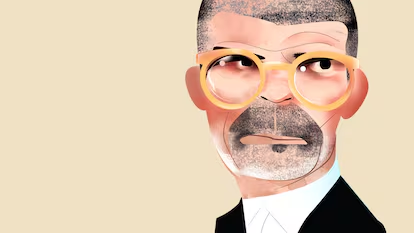David Mamet, the ‘progressive’ playwright who became a critic of woke culture
The American writer has gone from criticizing neoliberalism to supporting Donald Trump

David Mamet is a multidisciplinary and multi-thematic author. He is a playwright, essayist, novelist, screenwriter and film director. He has dealt with capitalism, sexuality, masculinity and Judaism. As a playwright – his first passion – he is an American icon. Mamet has written 35 plays, the most famous of which is Glengarry Glen Ross, which won him a Pulitzer and Tony. The 1983 play – which was later adapted for film – follows four real estate agents in Chicago as they play games against one another in a bid to close sales. Anything goes as long as they are not fired. The play exposes the dirty face of neoliberalism from a left-wing point of view. Mamet, who had worked in a real estate agency, knew what he was talking about.
The playwright is recognized worldwide for his fast, controversial and incisive works. “He is a complex author,” says Spanish author Nacho Cagiga, who wrote a book about Mamet. “He tells a lot more than what is seen on the surface.”
However, something seems to have changed in recent years: Mamet’s ideology. In his recent book, Recessional: The Death of Free Speech and the Cost of a Free Lunch, Mamet says that “Trump did a great job as president.” In the book – a collection of essays, which was published in the conservative journal National Review – Mamet comes out in support of the former US president’s policies: he makes fun of coronavirus measures and gender ideology, accuses the left of curtailing freedom of expression for fear of offending minority groups and criticizes Palestine supporters in the conflict with Israel.
For those who are familiar with Mamet as an essayist, this shift will come as no surprise. Back in 2008, Mamet penned an op-ed in The Village Voice titled Why I Am No Longer a ‘Brain-Dead Liberal’, in which he wrote: “I took the liberal view for many decades, but I believe I have changed my mind.” So what’s behind the wordsmith’s change of heart?
Mamet is the son of a teacher and labor attorney, who were both Jewish and communist (his father had a great influence on his beliefs as a child). He has one sister, Lynn, who is younger than him, and together they witnessed the breakdown of their parents’ marriage.
At age 11, Mamet and his “beloved” sister moved in with their mother and her new partner. In an essay in Harper’s Magazine, titled The Rake, Mamet recounted the physical and psychological abuse that he and his sister suffered at the hands of their stepfather. Lynn suffered the brunt of the violence and was beaten under any pretext (which made the playwright feel very guilty). Later, Lynn, who is now an actress and screenwriter, made a comment that may explain Mamet’s high productivity. She said that they both faced down “a devil, and as a result we will never run out of stories.” “The very thing that could have destroyed us and driven us to silence ultimately led us to open our veins on white bond and make a living,” she told The New York Times in a 1997 interview.
When asked about the sharp dialogues in his work, in another interview, David Mamet stated that before they had a television, they liked to “while away the evenings by making ourselves miserable, solely based on our ability to speak the language viciously.”
In 1977, Mamet married actress Lindsay Crouse, with whom he had two children. But 13 years later, he fell in love with Rebecca Pidgeon, another actress who he was working with at the time. They got married in 1991 and had children. According to Brenda Murphy, professor emeritus at the University of Connecticut and author of the book Understanding David Mamet, the playwright rediscovered Judaism during his second marriage, and this coincided with the change of his ideology.
The starting point, Murphy says, was the Democratic Party’s support for the Palestinian cause. But more was to come. Last year, Mamet supported Florida’s so-called Don’t Say Gay law, which bars instruction on sexual orientation and gender identity among children under the age of eight. During a TV interview with the conservative Fox network, Mamet stated that teachers are “inclined” towards pedophilia and that children are being “groomed” for sexual abuse. And in a 2022 interview with The Guardian, Mamet resisted calling himself a Republican, but did say he wanted to protect the values that he grew up with: “the love of family, the love of the country, love of service, love of God, love of community.”
Sign up for our weekly newsletter to get more English-language news coverage from EL PAÍS USA Edition
Tu suscripción se está usando en otro dispositivo
¿Quieres añadir otro usuario a tu suscripción?
Si continúas leyendo en este dispositivo, no se podrá leer en el otro.
FlechaTu suscripción se está usando en otro dispositivo y solo puedes acceder a EL PAÍS desde un dispositivo a la vez.
Si quieres compartir tu cuenta, cambia tu suscripción a la modalidad Premium, así podrás añadir otro usuario. Cada uno accederá con su propia cuenta de email, lo que os permitirá personalizar vuestra experiencia en EL PAÍS.
¿Tienes una suscripción de empresa? Accede aquí para contratar más cuentas.
En el caso de no saber quién está usando tu cuenta, te recomendamos cambiar tu contraseña aquí.
Si decides continuar compartiendo tu cuenta, este mensaje se mostrará en tu dispositivo y en el de la otra persona que está usando tu cuenta de forma indefinida, afectando a tu experiencia de lectura. Puedes consultar aquí los términos y condiciones de la suscripción digital.









































